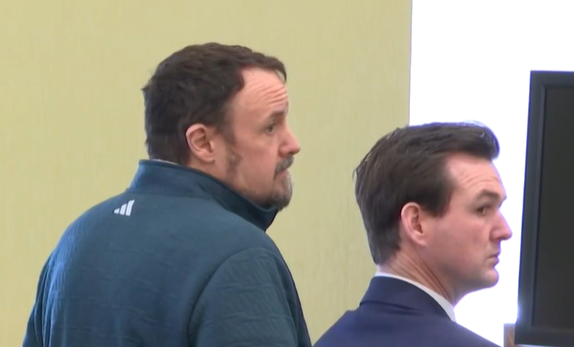By DAMIEN FISHER, InDepthNH.org
DOVER – Timothy Verrill was found guilty on two counts of second-degree murder for the brutal deaths of Christine Sullivan and Jenna Pellegrini, while the jury found him not guilty of first-degree murder charges.
Verrill, 41, was convicted Tuesday afternoon after the jury took several days to consider the case, which it got last Wednesday. One jury member called out sick on Tuesday, and Strafford Superior Court Judge Mark Howard instructed the remaining jurors to restart deliberations with an alternate member Tuesday morning.
The newly constituted jury took several hours before reaching the verdicts Tuesday afternoon. Verrill was found guilty on the lesser second-degree murder charges, as well as five counts of falsifying physical evidence, though he was found not guilty on the first degree-murder counts. On Monday, the jury asked Howard for a definition of “cause,” as it relates to the charges that Verrill caused the women’s deaths.
Verrill’s conviction is a victory for prosecutors whose case is full of inconsistencies. Verrill’s DNA is excluded from the material taken from Sullivan’s rings which she wore when fighting off her attacker. The women’s deaths were ruled by the New Hampshire Chief Medical Examiner’s Office to have happened a day after Verrill is alleged to have killed them. And key prosecution witnesses like Josh Colwell and Stephen Clough were both compromised by their own criminal activities.
Dean Smoronk, Sullivan’s boyfriend and partner in a drug trafficking business, called police on Jan. 29, 2017 to report finding Sullivan and Pellegrini’s bodies under the porch of his Farmington home. Sullivan had been bludgeoned and stabbed, and Pellegrini had been stabbed approximately 40 times before being wrapped in a tarp and hidden under the porch.
Smoronk and Sullivan were in the middle of a break up, with Sullivan planning to move out of the house. They were also fighting for control of the drug business. Smoronk sent Sullivan numerous threatening and violent text messages in the days before she was killed. He also reportedly offered a Florida man money to kill Sullivan weeks before the murders.
Smoronk, though, was out of town when the women were killed. He left New Hampshire for Florida on Jan. 26, and did not come back until late on Jan. 28, though one source told police he came back to New Hampshire secretly and was present for the murders along with Clough and another man.
Colwell testified that Verrill was suffering a mental health crisis brought on by heavy drug use, and in a paranoid state of mind on Jan. 27, asked Colwell if Pellegrini was a police informant.
Police and prosecutors allege Verrill went to the Farmington home on Jan. 27, turned off the security cameras on the property, and murdered the women. He is seen on the video taken from the house with the women and is reportedly the only person with them in the hours before the state says they were murdered.
Smoronk brought in drugs like cocaine from Florida, while Sullivan had connections in California for methamphetamine and cocaine, according to court records. The two had a pending criminal case out of South Carolina after they were arrested in 2016 with a significant quantity of methamphetamine and bomb making material. In one text message introduced during the trial, Smoronk speculates Sullivan might turn informant.
Verrill was friends with Sullivan, and dealt drugs for her, according to court records. At the time of the murders, Verrill was reportedly trying to get out of the business.
Verrill’s friend Colwell, meanwhile, was starting a new drug dealing venture with Smoronk at the time. Colwell was a member of the Mountain Men Motorcycle Club, and had been collecting debts for Smoronk when they started a cocaine dealing business using Colwell’s connections in the motorcycle club world.
On Jan. 26, Smoronk showed Colwell how to operate the security camera system at the house.
Clough, who died before the trial started last month, was in fact an informant for the DEA. In the early days of the investigation, Clough was considered a suspect and was unable to take a polygraph test when it was determined he had a “guilty knowledge” of the crime.
Not all of the incriminating information about Clough, Smoronk, and other men in the drug dealing/motorcycle club circle made it to the jury for this trial. It is part of the evidence withheld from the defense in the 2019 trial.
Evidence handling errors by New Hampshire State Police investigators are blamed for the substantial amount of evidence not turned over to Verrill’s defense. More than two weeks into the 2019 trial, prosecutors started handing this evidence over. This forced that trial to end in a mistrial.
New Hampshire Attorney General John Formella thanked prosecutors and police for their hard work securing the conviction.
“Our hearts go out to the families of Christine Sullivan and Jenna Pellegrini as well as to all those who knew and loved them. Today’s verdict delivers justice, and we hope it also brings some solace to the victims’ loved ones. Today we reaffirm our state’s commitment to justice and the value of every life. I extend my thanks to our trial team, to the New Hampshire State Police, and to the Farmington Police Department for their tireless work on this case,” Formella said.
Verrill, 41, is now likely to be sentenced to decades in prison. His sentencing date has not yet been finalized.





